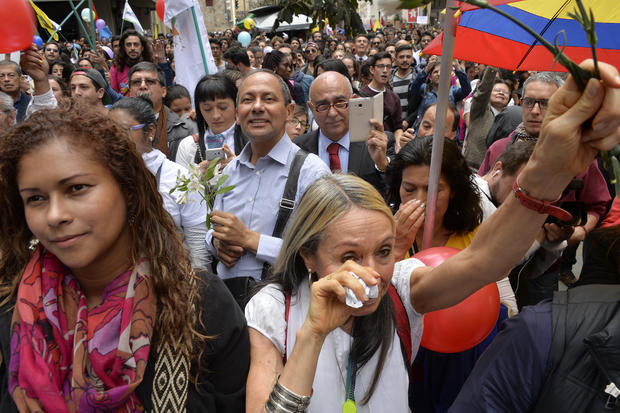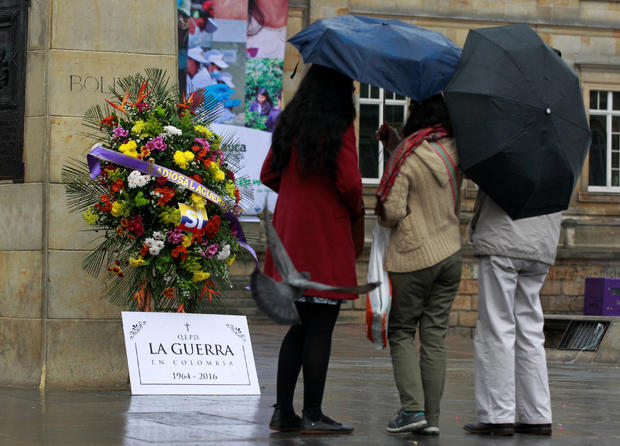Colombia and FARC rebel group sign historic ceasefire
HAVANA -- "Transcendental," "immense," "historic": these were the words used by the main protagonists in the signing of a landmark accord by the Colombian government and FARC rebels Thursday that virtually put an end to the longest-running guerrilla war in Latin America.
Colombian President Juan Manuel Santos and FARC Commander Timoleon "Timochencko" Jimenez shook hands as they held up accords signed by their respective negotiators, which seal a bilateral ceasefire and cessation of hostilities, rebel disarmament, guarantee of security for the FARC fighters and their transition to civilian life in a ceremony with the presence of Cuban President Raul Castro and Norwegian Foreign Minister Borge Brende representing the country guarantors of the peace talks underway for nearly four years in Havana.
Castro called the peace process "irreversible," adding, "Peace is fundamental for the enjoyment of all human rights, above all the right to life." Beaming broadly, he said, "Cuba will continue to contribute with modesty, discretion and respect for both sides."
The FARC is very concerned that signing the accord and disarming is not seen as its surrendering. In his words at the ceremony, Jimenez stressed that signing is "not a capitulation of the insurgency but the result of serious dialogue," adding it "cannot be seen as an imposition of one side on the other." While saying that the FARC and the government were very close to the signing of the final peace accord, he warned that everything won't be "the color of roses."
Santos, on the other hand, said, "This signifies nothing less than the end of the FARC as an armed group" and that the accord clearly "defines that the FARC will be disarmed." While noting that there is still violence in the country, criminal gangs connected to drug trafficking and the ELN guerrilla group, Santos emphasized that "this accord is with the oldest and largest guerrilla group" and "has an immense, an immense importance for the future of Colombia."
The Colombian president, who has been the driving force behind the peace talks, said that while he is "not and probably will never be in agreement with the FARC's vision for the political future of the country," the accord means they will be able to live together in peace despite their differences.
Details of the agreement read before Thursday's signing laid out the logistics of the FARC demobilization, including the concentration zones where they will gather to hand over their weapons to United Nations officials and from which the Colombian military will be barred. A 180-day deadline has been set for this process to be completed.
Within these zones, the FARC can set up educational retraining as it sees fit for its soldiers for their reincorporation into society and civilian life. It also provides protection for whatever civil organization emerges from the FARC to participate in the country's politics.
Although the final peace accord still remains to be penned, Thursday's agreement is of such importance that it drew all major leaders of countries and organizations with a stake in terminating the 52-year long conflict. The presidents of Chile, Michelle Bachelet, and Venezuela, Nicolas Maduro, both countries sponsors of the Havana talks; U.N. Secretary General Ban Ki-moon, the presidents of the U.N. General Assembly and of the Security Council and the presidents of El Salvador, the Dominican Republic and Mexico converged on the Cuban capital for this landmark event.
The U.N. will play a key role in the final stage of the peace process as it will take responsibility not just for disarming the rebels but for monitoring and verifying implementation of the accord.
There are some 7,000 heavily armed FARC combatants who will lay down their arms and begin the transition to a peaceful co-existence with Colombian security forces as a result of the agreement, which was celebrated on social media as #ElUltimoDiaDeLaGuerra ("the last day of the war"), according to a tweet by FARC negotiator Carlos Antonio Lozada. The war took 220,000 lives and displaced millions from their homes over the last 52 years. An informal cease-fire has been in effect for the past six months.
The agreement also covers action to be taken against criminal organizations behind murders and massacres, the paramilitary groups that targeted human rights defenders and political and social activists.
The U.S. sent special envoy Bernard Aronson, former Assistant Secretary of State for Inter-American Affairs, to witness the signing ceremony.
With the $10 billion Plan Colombia, Washington backed a 15-year Colombian government offensive against the FARC, which whittled its numbers down by at least 50 percent from an estimated 17,000 and killed several of its top leaders. The U.S. classified the FARC as a terrorist group and accused it of being a major supplier of cocaine to the U.S. market.
In moving ahead with the peace talks in Havana, President Santos broke with his former ally, ex-president Senator Alvaro Uribe, who is now heading the movement against the peace process and against Santos' intention of bringing the final accord to a national plebiscite. The FARC, fearing its unpopularity among the population, has not yet agreed to the holding of this national vote. Observers say, however, that no matter how distasteful the FARC is to people, Colombians -- anxious for an end to the conflict -- would most likely overwhelmingly approve the peace deal.

